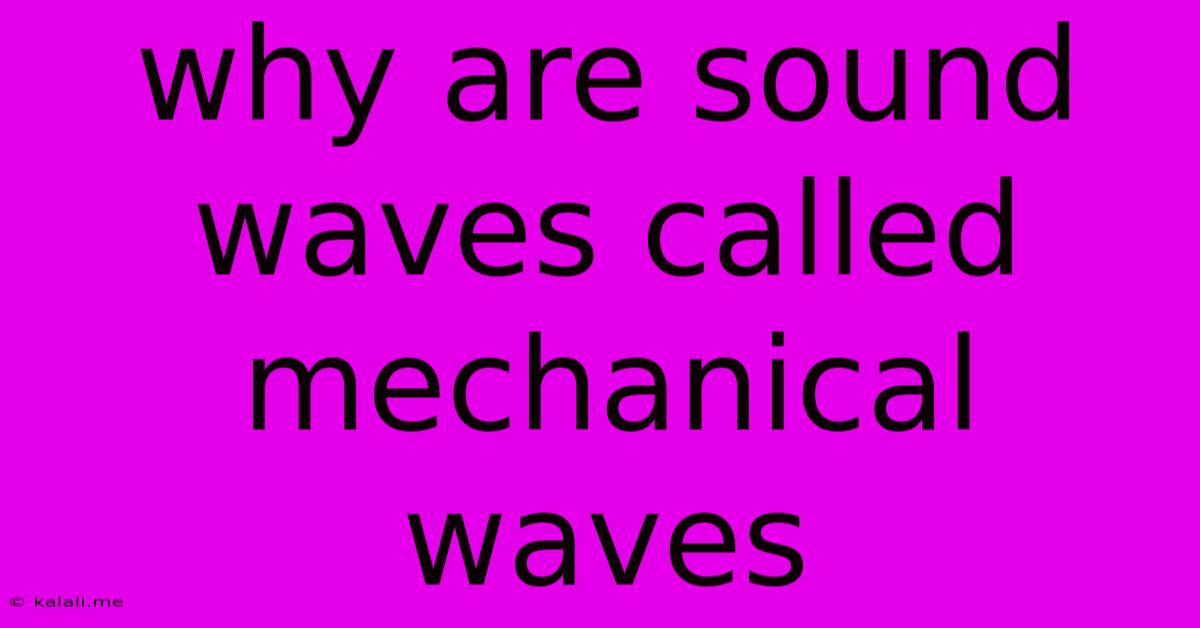Why Are Sound Waves Called Mechanical Waves
Kalali
Jun 14, 2025 · 3 min read

Table of Contents
Why Are Sound Waves Called Mechanical Waves? A Deep Dive into Their Nature
Sound, the very essence of communication and music, travels as a wave. But not just any wave – it's a mechanical wave. This seemingly simple classification holds a wealth of information about how sound behaves and interacts with the world around us. This article will explore the reasons why sound waves are classified as mechanical waves and delve into the properties that define them.
What exactly makes a wave mechanical? The key lies in the mechanism of its propagation. Unlike electromagnetic waves (like light) which can travel through a vacuum, mechanical waves require a medium to transmit their energy. This medium can be a solid, liquid, or gas. The wave's energy is transferred through the vibrations of the particles within this medium, causing a chain reaction of disturbances that propagate the wave outwards.
The Role of Particle Vibration in Sound Transmission
Sound waves are created by the vibration of an object. Think of a guitar string: when plucked, it vibrates, causing the surrounding air molecules to vibrate as well. These vibrating air molecules then collide with their neighbors, transferring the energy onwards. This process continues, creating a longitudinal wave – where the vibrations are parallel to the direction of wave propagation – that travels through the air. The amplitude of these vibrations determines the loudness of the sound, while the frequency determines its pitch.
Why Sound Can't Travel in a Vacuum
The need for a medium is the defining characteristic of a mechanical wave. This is why sound cannot travel through a vacuum, like the space between Earth and the Moon. In a vacuum, there are no particles to vibrate and transmit the energy, thus rendering sound propagation impossible. This stark contrast with electromagnetic waves, which travel effortlessly through the vacuum of space, further solidifies the classification of sound as a mechanical wave.
Different Media, Different Sound Speeds
The speed of sound is not constant; it varies depending on the medium through which it travels. Sound travels faster in solids than in liquids, and faster in liquids than in gases. This is because the particles in solids are more tightly packed together, allowing for more efficient energy transfer through collisions. The elasticity and density of the medium also play significant roles in determining sound velocity. Understanding these factors is crucial in various fields, including acoustics, seismology, and underwater communication.
Other Examples of Mechanical Waves
Sound is not alone in the mechanical wave family. Other notable examples include:
- Water waves: These waves propagate through the water, involving both transverse and longitudinal components.
- Seismic waves: These waves travel through the Earth's interior, caused by earthquakes or other geological events.
- Waves on a string: Similar to the guitar string example, these waves involve the vibration of the string itself.
These diverse examples all share the common trait of requiring a medium for their propagation, firmly establishing their place within the category of mechanical waves.
Conclusion: The Essence of Mechanical Sound
In summary, sound waves are classified as mechanical waves due to their absolute dependence on a material medium for propagation. The vibration of particles within this medium is the fundamental mechanism that allows sound to travel, highlighting the critical role of matter in sound transmission. Understanding this fundamental principle is key to appreciating the rich physics behind the everyday phenomenon of sound.
Latest Posts
Latest Posts
-
Which Country Is Lake Victoria In
Jun 14, 2025
-
Economics Can Be Best Defined As The Study Of
Jun 14, 2025
-
Why Do We Need A Constitution
Jun 14, 2025
-
Which Of The Following Statements Regarding Radioactive Decay Is True
Jun 14, 2025
-
All Of The Following Are Barriers To Effective Communication Except
Jun 14, 2025
Related Post
Thank you for visiting our website which covers about Why Are Sound Waves Called Mechanical Waves . We hope the information provided has been useful to you. Feel free to contact us if you have any questions or need further assistance. See you next time and don't miss to bookmark.